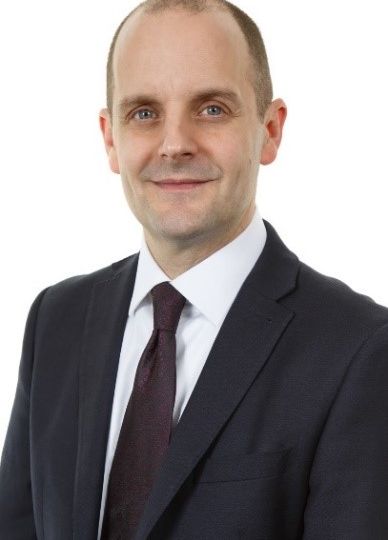
Over the last 20 years, Matt has developed a strong track record in delivering sustained strategic and commercial development of conformity assessment in both established and emerging markets.
Before joining UKAS as CEO in September 2018, Matt was Managing Director of NQA and had previously held key commercial and international leadership positions in Ascertiva Group and Certsure LLP. He was also Chair of the Association of British Certification Bodies and a regular contributor to both CQI and UK Trade & Investment events. Matt has also been an active member of SSIP, IOSH and IEMA.
Matt’s academic background includes an MSc in Environmental Impact Assessment and an MBA, both of which involved studying at universities across the world. He is also a visiting lecturer at Manchester Business School, specialising in strategic management.
1. What changes to the strategy, structure and services of UKAS do you hope to see in the near and mid-term?
Under the stewardship of my predecessor Paul Stennett, the Executive Team at UKAS has already done a fantastic job in establishing a proven strategy of continually improving customer service whilst simultaneously developing new and innovative areas of accreditation that meet the needs of industry, public bodies and end users. I am looking forward to working with the UKAS team and key stakeholders to continue the drive to deliver a great accreditation experience for clients, to increase the value and relevance of accreditation, and to ensure that this delivers confidence and trust across the wide range of industries that UKAS serves. This will ensure that UKAS and accreditation continues to play a central role in supporting both the UK’s quality infrastructure and government’s industrial strategy.
2. Having come from a certification body what do you think this has taught you about customer service and how will this influence the direction of travel for UKAS?
Accreditation to internationally recognised standards is increasingly being adopted by both regulators and customers as a flexible and practical alternative to regulation. Together with its quality infrastructure partners, UKAS has always worked closely with its customers to ensure that accreditation delivers great value for the market and remains relevant to customers’ industries.
Feedback from UKAS customers will continue to remain a key part of both service delivery and the development process, helping UKAS deliver an accreditation ‘product’ that meets the needs of policy makers, customers and the users of accredited services. For example, following reports that some smaller organisations can see the route to accreditation as overwhelming, UKAS is currently working on a number of projects to enable accreditation to be more accessible for micro-businesses.
3. How do you see the role of accreditation services evolving in a ‘post Brexit’ environment?
Having confidence in the quality of goods and services procured both at home and abroad is a vital component of international trade. Together, standards, conformity assessment and accreditation form the pillars of a global quality infrastructure that is key to generating this confidence.
Accreditation is a global activity that delivers certainty in uncertain times, helping UK businesses navigate different national regulatory regimes through a process of mutual equivalence recognition in over 90 countries across the world. This “accredited once, accepted everywhere” approach opens global markets and saves businesses time and money by avoiding the unnecessary duplication of conformity assessment activity. Given the uncertainty surrounding the post-Brexit environment I expect accreditation to play an even greater role than it does now in facilitating the acceptance of goods and services across national borders and lowering technical barriers to trade.
4. What do you see as the most challenging issues facing UKAS at the present moment?
I see three key areas of challenges; Brexit, the pace of technology and its influence on society, and the threat from online peer-to-peer reviews to seek reassurance of purchasing decisions.
Following the triggering of Article 50, UKAS has been working hard in ensuring that those within Government dealing with Brexit are fully aware of the importance of accreditation to the national economy, and also to trade with the EU and internationally. Regular meetings are being held with Ministers and officials in the Department for Business, Energy and Industrial Strategy (BEIS), the Department for Exiting the EU (DExEU) and the Department for International Trade (DIT).
Following consultation with customers and stakeholders, including BMTA members, UKAS has been proactive in promoting a Post-Brexit environment where UKAS’ recognition as the UK National Accreditation Body continues under UK law, it continues to be a member of EA, ILAC and IAF in order to safeguard the European and international recognition of accreditation and accredited services, there is continued access to UK based notified bodies to provide conformity assessment required by EU legislation, and that mutual recognition of conformity assessment is factored into any new trade agreement between the UK and the EU.
UKAS has also sought clarity from Government on the recognition of UK notified bodies in the event of a “No Deal” scenario. The recent Government Technical Notice on the proposals for trading goods regulated under the new approach confirms that UKAS’s role as the national accreditation body will remain as it is now.
Secondly, the increasing pace of technology and its influence on society is widely reported. In parallel, some commentators have chronicled an erosion of public confidence in traditional institutions established to provide assurance or regulatory compliance (e.g. the VW/Audi diesel emission case). Nevertheless, the consumer’s desire for quality, safety and sustainability remains intact. Technology provides players within the quality assurance supply chain with opportunities to connect and interact more efficiently and effectively. Several certification, inspection and assurance bodies have developed cloud-based system to provide greater insight for customers as well as enable remote auditing. Sector specific assurance schemes such as IATF 16949 have established supply chain databases allowing OEMs to access comprehensive data and detailed quality performance KPIs on supplier, auditor and certification body performance.
At the same time, many consumers are becoming increasingly reliant on digital peer-to-peer reviews to validate and seek reassurance of purchasing decisions (e.g. TripAdvisor and Amazon). UKAS will work to analyse and fully understand the trajectory and influence of these changes on the National Quality Infrastructure (NQI) so that it is able to adapt to these emerging trends in IT and ensure that accreditation remains a useful and relevant tool for businesses and regulators both now and in the future.
5. The 17025:2017 transition is clearly a significant issue for the TIC industry and a significant project for UKAS. How do UKAS see this unfolding at present and what advice would you like to give to organisations in that process of transition?
A lot has changed within the laboratory industry since the previous version of ISO/IEC 17025 came into effect in 2005. ISO/IEC 17025 had to adapt if it was to reflect these changes and remain the international reference point for laboratories wishing to demonstrate their ability to produce reliable and accurate results.
Amongst the key changes incorporated into ISO/IEC 17025:2017 is the adoption of the process approach matching the newer ISO 9001, 14001 and 15189 standards, this puts the emphasis on the results of the process, rather than a detailed description of tasks and steps. The 2017 version also caters for changes in both the technology and vocabulary commonly used, helping to ensure ISO 17025:2017 better serves the needs of the modern laboratory and remains the best indicator of competency for its customers. There is a new section that introduces the concept of risk-based thinking and describes the elements that are common with ISO 9001:2015.
On the 20th November 2020, ISO/IEC 17025:2005 will cease to be recognised, by which time all laboratories will need to have transitioned to the new 2017 version in order to maintain their ISO/IEC 17025 accreditation. Through its experience with successfully implementing recent transitions for other standards used for accreditation, such as ISO/IEC 17021-1, along with its involvement in the ISO/IEC 17025 CASCO working group, UKAS was able to develop a transition process that simultaneously confirms ongoing competence and compliance with the standard whilst avoiding placing an excessive burden on laboratories.
To ensure all laboratories have transitioned successfully by the deadline UKAS began offering the option of being assessed against the 2017 standard in March this year. From the 1st January 2019, all UKAS ISO 17025 assessments will be conducted against the 2017 standard, with the target for all transition assessments to be completed by 31st May 2019, some six months before the 2005 standard ceases to be valid.
To help laboratories understand the changes and the rationale behind them, UKAS is running a series of one day awareness seminars and three day training courses throughout 2018 and 2019. Details can be found on the UKAS website. https://www.ukas.com/customer-area/isoiec-170252017-transition/

